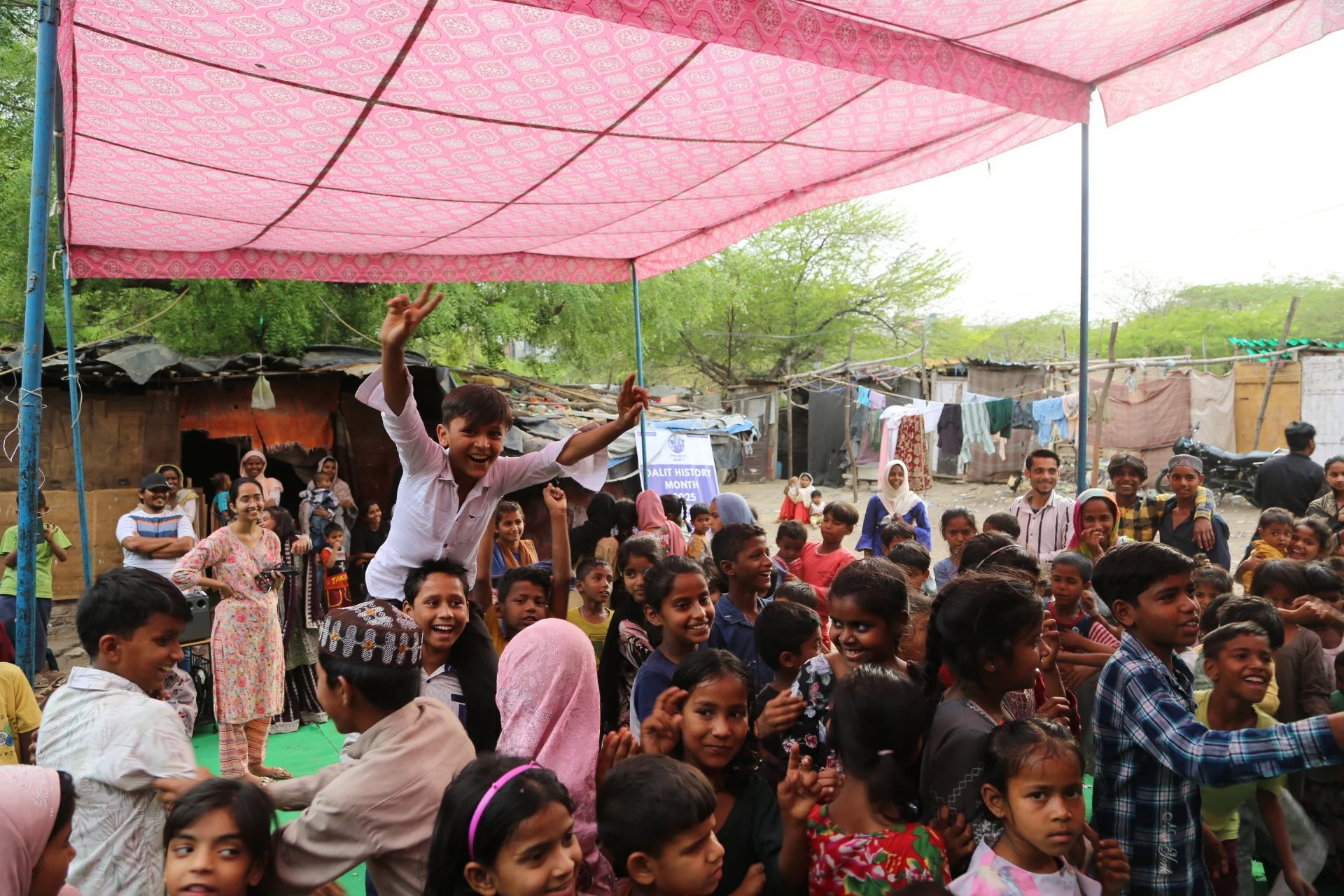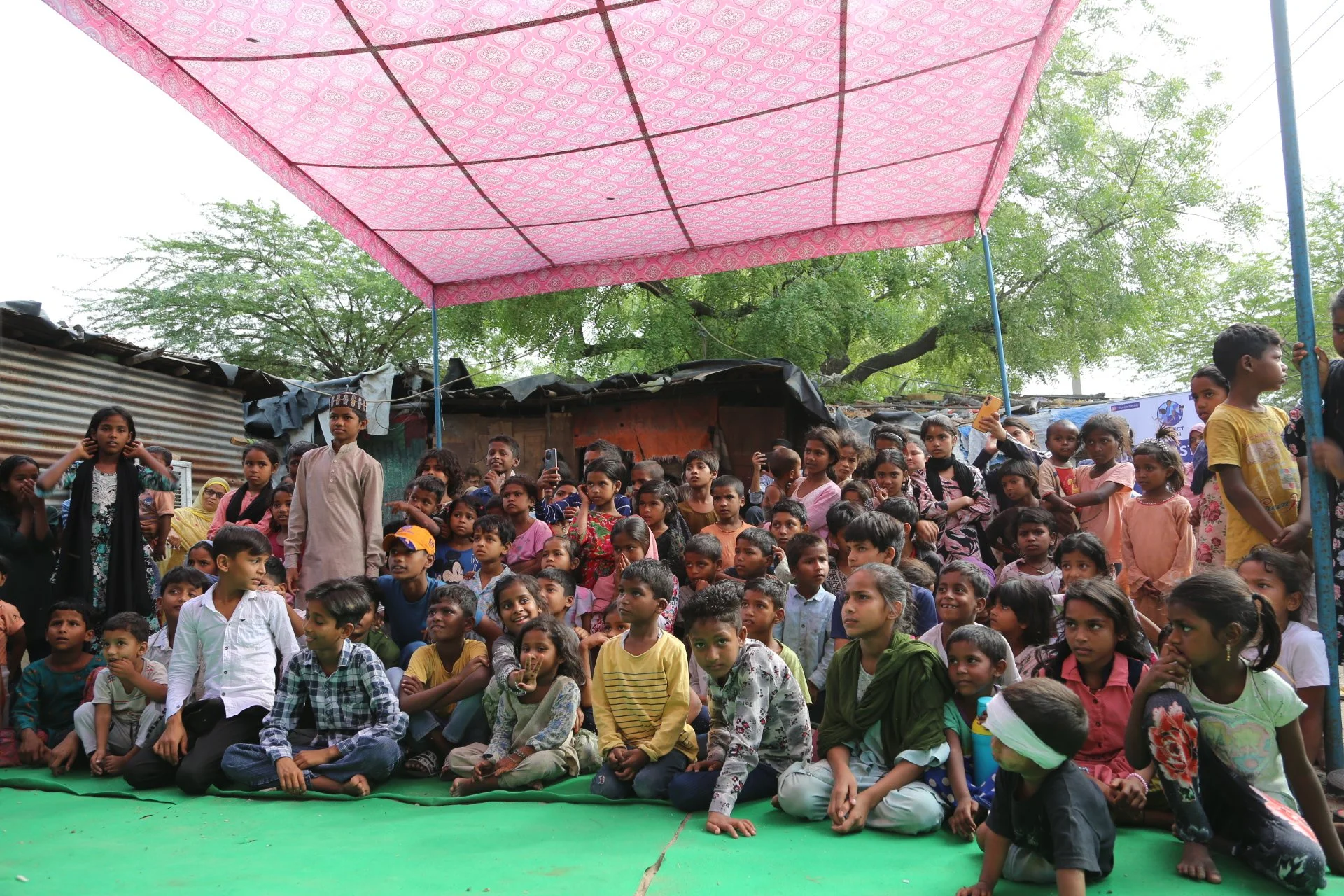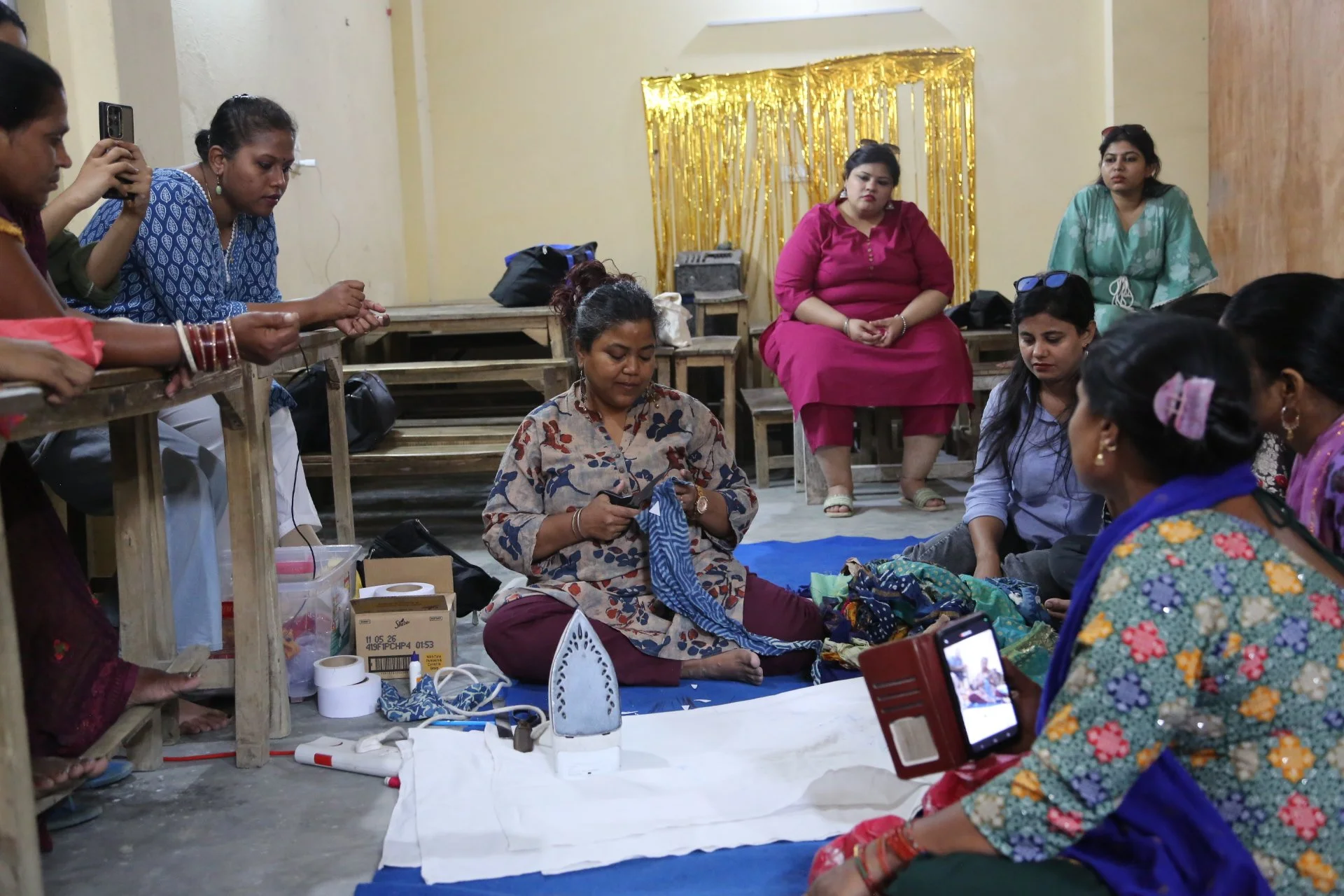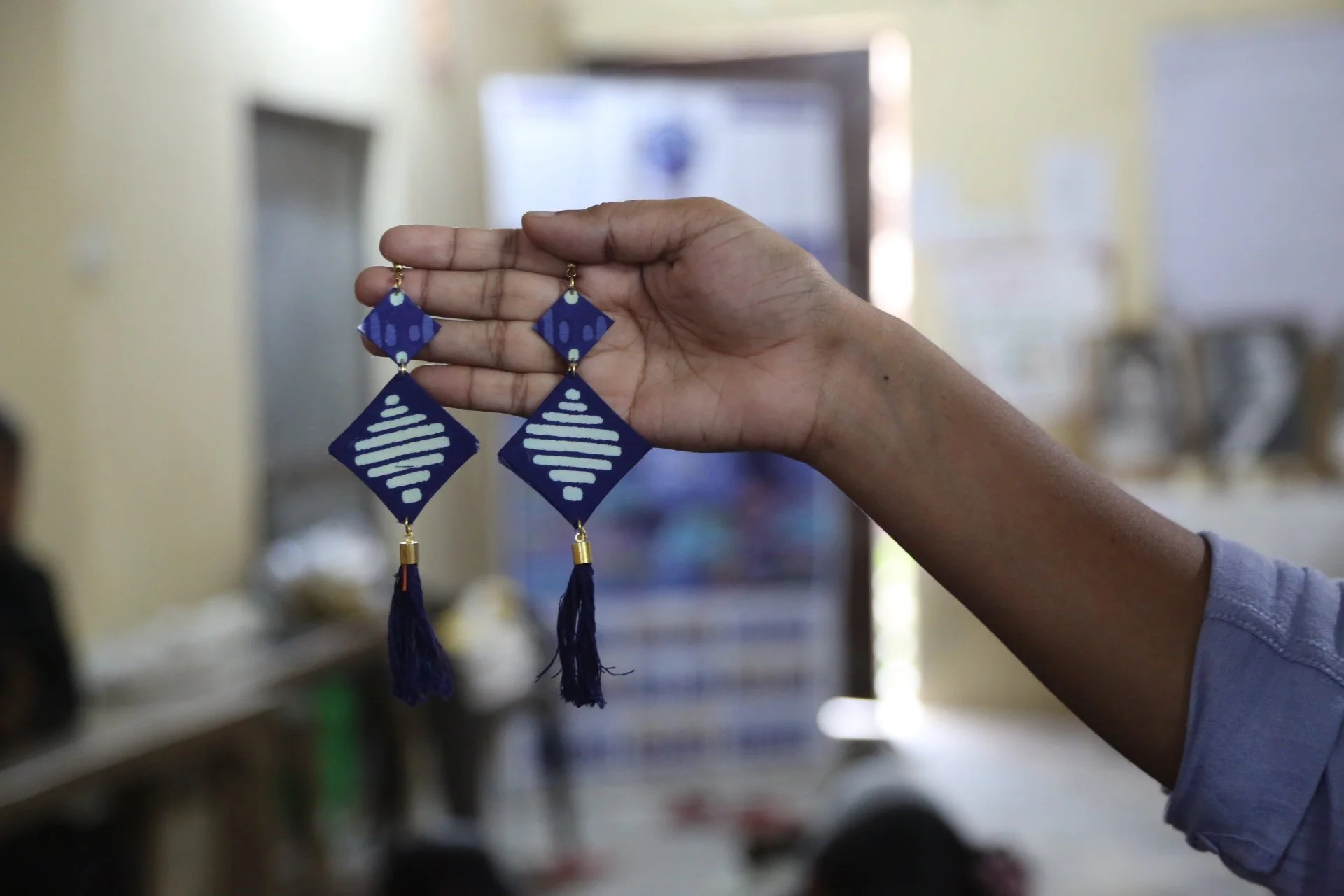Dalit History Month 2025 Celebrations
Introduction: An Overview of the Observance
Dalit History Month (DHM) was launched in 2015, and to mark its 10th anniversary, Project Mukti hosted a series of vibrant, community-rooted initiatives reflecting our ongoing commitment to cultural assertion, political education, and intersectional dialogue. Our events sought to deepen engagement with Dalit history, Ambedkarite thought, and gendered resistance, especially among youth and women in underrepresented communities.
These efforts were not confined to formal spaces, they extended into urban margins, Muslim-dominated bastis, resettlement camps, and women’s informal collectives. The celebrations combined theatre, workshops, health sessions, and site-based experiences of solidarity. The month reaffirmed our belief in reclaiming history as a tool for transformation.
Key Events and Community Engagements
All the events started with the playing of Buddha Vandana, a hymn embodying the ethos of equality and mindfulness, beautifully sung and recorded by our Director, Sanghapali Aruna. This was followed by the ritualistic offering of flowers and the lighting of candles by the guests of honor before portraits of seminal anti-caste leaders: Babasaheb Dr. B.R. Ambedkar, Dharti Aba Birsa Munda, Mahatma Jotiba Phule, and Kranti Jyoti Savitribai Phule. These acts held profound symbolic significance, collectively honoring their tireless efforts to dismantle caste oppression and affirm the agency of marginalized communities.
1. Play on ‘Gender’ and ‘Ambedkar’- Noor Nagar (Jamia Nagar)
The first major event of Dalit History Month (DHM) was held in Noor Nagar, a predominantly Muslim working-class locality behind Jamia Millia Islamia University. Project Mukti’s young learners performed a play centered on Gender and Babasaheb Ambedkar. The play critically explored women’s rights across domains like education, maternity benefits, family planning, healthcare, and religious autonomy.
The locality represented a new frontier, underserved, invisibilized, yet brimming with youth energy and solidarity. Children, elders, shopkeepers, and women from the community, each of them contributing to the social life of the neighborhood. Noor Nagar emerged as a potential new community for future engagement, as the play drew a large number of children as the audience. Several community members, mostly women, expressed a strong desire for educational interventions, requesting that we explore ways to teach the children.
2. 14th April - Parliament Street Visit (Ambedkar Jayanti)
Every year, on April 14th, thousands of people pay a visit to the statue of Babasaheb located in the Parliament premises. This year, our team’s collective visit to Parliament Street on April 14, Ambedkar Jayanti, functioned as a critical experiential learning moment. The sight of Parliament Street painted in blue, dotted with stalls, food kiosks, flags, and vibrant expressions of Dalit pride offered a rare glimpse into the affective world of Dalit assertion. There were hundreds of stalls that were put up by SC/ST employees' associations from large public and private entities, anti-caste publishing houses, NGOs, etc. The event reanimated public space as a site of joy, resistance, and community formation.
3. Play on ‘Gender’ and ‘Ambedkar’ - Arjun Camp (with Nari Shakti Sangh Collaboration)
All activities in Arjun Camp, a marginalized urban settlement, were organized in collaboration with Ms. Sunita Kamal from Naari Shakti Sangh, leveraging her deep roots and community work in the area to ensure meaningful engagement and participation.
The event began with a ‘Play for Peace’ session led by Mr. Ajat Shatru, a long-time collaborator, which served as an energetic icebreaker. This session helped gather a significant crowd, particularly children, and created an atmosphere of openness and curiosity.
This was followed by the play on ‘Gender and Ambedkar’ performed by our younger learners. Their performance not only brought these important themes to life but also encouraged reflection and dialogue within the community.
A short dance performance on Savitri Bai Phule, by Meera, one of our former learners, was also included. Her performance brought a sense of cultural celebration and joy to the event, helping further energize the crowd and make the gathering feel participatory.
4. Fabric Jewelry-Making Workshop - Nangloi
Led by Sanghapali Aruna, Executive Director of Project Mukti, a fabric jewelry-making workshop was held with around 10 women in Nangloi. This workshop explored sustainable practices through creative expression, encouraging participants to create something of their own from fabric scraps.
It challenged the narrative that only formal employment counts as labor by celebrating the labor of craft, care, and creativity. It also subtly planted the seeds of entrepreneurship among the women, with discussions on how such products could eventually be sold or showcased. The session was intimate, dialogic, and deeply transformative.
5. Building Together: A Dalit History Month Collaboration with Kranti Collective
Project mukti joined hands with Kranti Collective for a day of collective action, creativity, and community building. The event took place at the library space with three powerful activities: Collective Library Building, Diary-Making Workshop and Dalit History Month–themed Art and Drawing Session.
It brought together participants of all ages, mostly women and girls from the local community, who filled the space with warmth, laughter, and learning. We began the day by cleaning and reorganizing the library shelves at @kranticollective, transforming the space together. As more people arrived, the library quickly turned into a hub of energy and colour. Children, guided by volunteers, started drawing with crayons, sketch pens, and paints. They even got to draw on the walls!
The highlight of the day was the Diary-Making Workshop, led by Nirjesh Gautham, who later shared their reflections on Instagram. “A gift to ourselves on Ambedkar Jayanti. With the essence of valuing whatever available resources we have. And the pursuit of making waste into resources. Thank you all for making this happen. We are such a powerful community.”
The day ended with smiles, paint and glue-stained hands, and a renewed sense of purpose — a reminder that community spaces, when nurtured collectively, can become sites of both learning and liberation.
6. Reproductive Health Session – RK Puram Community
A reproductive health awareness session was organized in RK Puram, attended by around 20–25 women. The session was conducted by our Community Outreach Lead and Personal Development Coach, Dr. Manisha Meshram, who holds Ph.D. from the JNU School of Social Medicine and Community Health. It addressed topics like menstrual hygiene and bodily autonomy. What began as an ice-breaker quickly turned into an engaging and reflective conversation, as participants opened up about the emotional toll of domestic responsibilities, stress, and the silence surrounding mental well-being in their everyday lives.



























